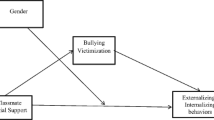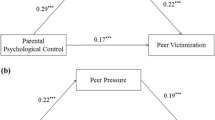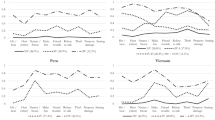Abstract
Guided by the Risk and Resilience Model, the present study aims to generate hypotheses by investigating a wide range of variables that might buffer the association between peer victimization and internalizing symptoms from a convenience sample of African American adolescents in four neighborhoods in Chicago’s Southside. Measures for the study included internalizing symptoms, peer victimization, four protective factors (parental closeness, teacher’s care, religiosity, and positive future orientation) and covariates (age, sex, and government assistance). Controlling for the covariates, a series of multivariate regression analyses were conducted to explore the direct effects of peer victimization and internalizing symptoms and the interaction between peer victimization and the four protective factors. The study found that peer victimization was directly associated with internalizing symptoms. In terms of the interactions, the study found that parental closeness moderated the association between peer victimization and internalizing symptoms. The findings show that parental closeness is an important protective factor that needs to be considered in the research hypotheses. The findings specifically demonstrated the importance of developing hypotheses to test whether parental closeness protects adolescents from internalizing symptoms linked to peer victimization.



Similar content being viewed by others
Data Availability
The authors assume responsibility for the accuracy of the data analysis.
References
Atkins, M. S., Frazier, S. L., Birman, D., Adil, J. A., Jackson, M., Graczyk, P. A., Talbott, E., Farmer, A. D., Bell, C. C., & McKay, M. M. (2006). School-based mental health services for children living in high poverty urban communities. Administration and Policy in Mental Health and Mental Health Services Research, 33(2), 146159. https://doi.org/10.1007/s10488-006-0031-9
Archer, J., & Coyne, S. M. (2005). An integrated review of indirect, relational and social aggression. Personality and Social Psychology Review, 9(3), 212–230. https://doi.org/10.1207/s15327957pspr0903_2
Baer, L., Jacobs, D. G., Meszler-Reizes, J., Blais, M., Fava, M., Kessler, R., & Leahy, L. (2000). Development of a brief screening instrument: the HANDS. Psychotherapy and Psychosomatics, 69, 35–41. https://doi.org/10.1159/000012364
Baldry, A. C. (2004). The impact of direct and indirect bullying on the mental and physical health of Italian youngsters. Aggressive Behavior, 30(5), 343–355. https://doi.org/10.1002/ab.20043
Ball, J., Armistead, L., & Austin, B. J. (2003). The relationship between religiosity and adjustment among African-American, female, urban adolescents. Journal of Adolescence, 26(4), 431–446. https://doi.org/10.1016/S0140-1971(03)00037-X
Barzilay, S., Klomek, A. B., Apter, A., Carli, V., Wasserman, C., Hadlaczky, G., & Brunner, R. (2017). Bullying victimization and suicide ideation and behavior among adolescents in Europe: A 10-country study. Journal of Adolescent Health, 61(2), 179–186. https://doi.org/10.1016/j.jadohealth.2017.02.002
Benhorin, S., & McMahon, S. D. (2008). Exposure to violence and aggression: Protective roles of social support among urban African American youth. Journal of Community Psychology, 36(6), 723–743. https://doi.org/10.1002/jcop.20252
Biesecker, L. G. (2013). Hypothesis-generating research and predictive medicine. Genome Research, 23(7), 1051–1053. https://doi.org/10.1101/gr.157826.113
Bowllan, N. M. (2011). Implementation and evaluation of a comprehensive, school-wide bullying prevention program in an urban/suburban middle school. Journal of School Health, 81(4), 167–173. https://doi.org/10.1111/j.17460-1561.2010.00576.x
Brewster, S. L., Jr., Brewster, H. J., & Kulik, K. S. (2018). Bullying victimization in schools: Why the whole school, whole community, whole child model is essential. Journal of School Health, 88(11), 794–802. https://doi.org/10.1111/josh.12686
Bronfenbrenner, U. (1977). Toward an experimental ecology of human development. American Psychologist, 32(7), 513–531. https://doi.org/10.1037/0003-066X.32.7.513
Card, N. A., & Hodges, E. V. E. (2008). Peer victimization among schoolchildren: Correlations, causes, consequences and considerations in assessment and intervention. School Psychology Quarterly, 23(4), 451–461. https://doi.org/10.1037/a0012769
Chatters, L. M., Taylor, R., Jackson, J., Lincoln, K., Nguyen, A., & Joe, S. (2011). Church-based social support and suicidality among African American and Black Caribbeans. Archives of Suicide Research, 15(4), 337–353. https://doi.org/10.1080/13811118.2011.615703
Chen, Q., Zhu, Y., & Chui, W. H. (2020). A meta-analysis on effects of parenting programs on bullying prevention. Trauma, Violence, & Abuse. https://doi.org/10.1177/1524838020915619
Childs, G., Moneyham, L., & Felton, G. (2008). Correlates of sexual abstinence and sexual activity of low-income African-American adolescent females. Journal of the Association of Nurses in AIDS Care, 19(6), 432–442. https://doi.org/10.1016/j.jana.2008.04.013
Claes, L., Luyckx, K., Baetens, I., Van de Ven, M., & Witteman, C. (2015). Bullying and victimization, depressive mood and non-suicidal self-injury in adolescents: The moderating role of parental support. Journal of Child and Family Studies, 24(11), 3363–3371. https://doi.org/10.1007/s10826-015-0138-2
Coopersmith, S. (1967). The antecedents of self-esteem. W. H. Freeman.
Crick, N. R., & Nelson, D. A. (2002). Relational and physical victimization within friendships: Nobody told me there’d be friends like these. Journal of Abnormal Child Psychology, 30(6), 599–607. https://doi.org/10.1023/A:1020811714064
Curtner-Smith, M. E., Culp, A. M., Culp, R., Scheib, C., Owens, K., Tilley, A., Murphy, M., Parkman, L., & Colemann, P. W. (2006). Mothers’ parenting and young economically disadvantaged children’s relational and overt bullying. Journal of Child and Family Studies, 15(2), 181–193. https://doi.org/10.1007/s10826-005-9016-7
Dutkova, K., Holubeikova, J., Kravcova, M., Babincak, P., Tavel, P., & Geckova, A. M. (2017). Is spiritual well-being among adolescents associated with a lower level of bullying behaviour? The mediating effect of perceived bullying behaviour of peers. Journal of Religion and Health, 56, 2212–2221. https://doi.org/10.1007/s10943-017-0392-2
Eastman, M., Foshee, V., Ennett, S., Sotres-Alvarez, D., Reyes, H. L. M., Faris, R., & North, K. (2018). Profiles of internalizing and externalizing symptoms associated with bullying victimization. Journal of Adolescence, 65, 101–110. https://doi.org/10.1016/j.adolescence.2018.03.007
Espelage, D. L., & Holt, M. K. (2001). Bullying and victimization during early adolescence: Peer influences and psychosocial correlates. Journal of Emotional Abuse, 2(2–3), 123–142. https://doi.org/10.1300/J135v02n02_08
Estrada-Martinez, L. M., Caldwell, C. H., Bauermeister, J. A., & Zimmerman, M. A. (2012). Stressors in multiple life-domains and the risk for externalizing and internalizing behaviors among African Americans during emerging adulthood. Journal of Youth and Adolescence, 41, 1600–1612. https://doi.org/10.1007/s10964-012-9778-3
Farahmand, F. K., Grant, K. E., Polo, A. J., Duffy, S. N., & DuBois, D. L. (2011). School-based mental health and behavioral programs for low-income, urban youth: A systematic and meta-analytic review. Clinical Psychology: Science and Practice, 18(4), 372–390. https://doi.org/10.1111/j.1468-2850.2011.01265.x
Farmer, T. W., Irvin, M. J., Motoca, L. M., Leung, M., Hutchins, B. C., Brooks, D. S., & Hall, C. M. (2015). Externalizing and internalizing behavior problems, peer affiliations and bullying involvement across the transition to middle school. Journal of Emotional and Behavioral Disorders, 23(1), 3–16. https://doi.org/10.1177/1063426613491286
Fergus, S., & Zimmerman, M. A. (2005). Adolescent resilience: A framework for understanding healthy development in the face of risk. Annual Review of Public Health, 26, 399–419. https://doi.org/10.1146/annurev.publhealth.26.021304.144357
Fontenot, K., Semega, J., & Kollar, M. (2018). Income and poverty in the United States: 2017. Current Population Reports P60–263. U.S. Government Printing Office.
Ford, R., King, T., Priest, N., & Kavanagh, A. (2017). Bullying and mental health and suicidal behavior among 14- to 15-year-olds in a representative sample of Australian children. Australian and New Zealand Journal of Psychiatry, 51(9), 897–908. https://doi.org/10.1177/0004867417700275
Fowler, P. J., Ahmed, S. R., Tompsett, C. J., Jozefowicz-Simbeni, D. M. H., & Toro, P. A. (2008). Community violence and externalizing problems: Moderating effects of race and religiosity in emerging adulthood. Journal of Community Psychology, 36(7), 835–850. https://doi.org/10.1002/jcop.20267
Gladden, R. M., Vivolo-Kantor, A. M., Hamburger, M. E., & Lumpkin, C. D. (2014). Bullying surveillance among youths: Uniform definitions for public health and recommended data elements, Version 1.0. National Center for Injury Prevention and Control, Centers for Disease Control and Prevention and U.S. Department of Education.
Goldweber, A., Waasdorp, T. E., & Bradshaw, C. P. (2013). Examining associations between race, urbanicity and patterns of bullying involvement. Journal of Youth and Adolescence, 42, 206–219. https://doi.org/10.1007/s10964-012-9843-y
Gooden, A. S., & McMahon, S. D. (2016). Thriving among African-American adolescents: Religiosity, religious support and communalism. American Journal of Community Psychology, 57(1–2), 118–128. https://doi.org/10.1002/ajcp.12026
Hamilton, J. L., Connolly, S. L., Liu, R. T., Stange, J. P., Abramson, L. Y., & Alloy, L. B. (2015). It gets better: Future orientation buffers the development of hopelessness and depressive symptoms following emotional victimization during early adolescence. Journal of Abnormal Child Psychology, 43, 465–474. https://doi.org/10.1007/s10802-014-9913-6
Hayes, A. F. (2013). An introduction to mediation, moderation and conditional process analysis. Guilford Press.
Hong, J. S., Kim, D. H., Lee, C. A., Russ, R., Johns, S., & Voisin, D. R. (2019). Peer victimization and illicit drug use among African American adolescents in Chicago: The moderating effects of religious affiliation. Journal of the Society for Social Work and Research, 10(3), 333–348. https://doi.org/10.1086/704061
Huang, Y., Espelage, D. L., Polanin, J. R., & Hong, J. S. (2019). A meta-analytic review of school-based anti-bullying programs with a parent component. International Journal of Bullying Prevention, 1, 32–44. https://doi.org/10.1007/s42380-018-0002-1
Joe, S., Baser, R., Neighbors, H., Caldwell, C., & Jackson, J. (2009). 12-month and lifetime prevalence of suicide attempts among black adolescents in the National Survey of American Life. Journal of the American Academy of Child and Adolescent Psychiatry, 48(3), 271–282. https://doi.org/10.1097/CHI.obo13e318195bccf
Kann, L., McManus, T., Harris, W., Shanklin, S., Flint, K., Queen, B., & Ethier, K. (2018). Youth risk behavior surveillance — United States, 2017 (Surveillance Summaries). Centers for Disease Control and Prevention. https://www.cdc.gov/healthyyouth/data/yrbs/pdf/2017/ss6708.pdf
Kerpelman, J. L., Eryigit, S., & Stephens, C. J. (2008). African American adolescents’ future education orientation: Associations with self-efficacy, ethnic identity and perceived parental support. Journal of Youth and Adolescence, 37, 997–1008. https://doi.org/10.1007/s10964-007-9201-7
Knitzer, J. (2000). Helping troubled children and families: A paradigm of public responsibility. In J. Rappaport & E. Seidman (Eds.), Handbook of community psychology (pp. 541–563). Springer.
Kotchick, B. A., Papadakis, A. A., Nettles, C., & Jobe, S. L. (2020). Peer victimization and depressive symptoms in early adolescents: The protective role of perceived supportive parenting. Journal of Child and Family Studies, 29, 1350–1362. https://doi.org/10.1007/s10826-019-01610-6
Lebrun-Harris, L. A., Sherman, L. J., Limber, S. P., Miller, B. D., & Edgerton, E. A. (2019). Bullying victimization and perpetration among U.S. children and adolescents: 2016 National Survey of Children’s Health. Journal of Child and Family Studies, 28, 2543–2557. https://doi.org/10.1007/s10826-018-1170-9
Letendre, J., Ostrander, J. A., & Mickens, A. (2016). Teacher and staff voices: Implementation of a positive behavior bullying prevention program in an urban school. Children & Schools, 38(4), 237–245. https://doi.org/10.1093/cs/cdw032
Li, S. T., Nussbaum, K. M., & Richards, M. H. (2007). Risk and protective factors for urban African-American youth. American Journal of Community Psychology, 39, 21–35. https://doi.org/10.1007/s10464-007-9088-1
Lindau, S. T., Makelarski, J. A., Chin, M. H., Desautels, S., Johnson, D., Johnson, W. E., Jr., Miller, D., Peters, S., Robinson, C., Schneider, J., Thicklin, F., Watson, N. P., Wolfe, M., & Whitaker, E. (2011). Building community-engaged healthy research and discovery infrastructure on the South Side of Chicago: Science in service to community priorities. Preventive Medicine, 52(3–4), 200–207. https://doi.org/10.1016/j.ypmed.2011.01.001
Lucas-Molina, B., Williamson, A. A., Pulido, R., & Perez-Albeniz, A. (2015). Effects of teacher-student relationships on peer harassment: A multilevel study. Psychology in the Schools, 52(3), 298–315. https://doi.org/10.1002/pits.21822
Mann, M. J., Kristjansson, A. L., Sigfusdottir, I. D., & Smith, M. L. (2015). The role of community, family, peer and school factors in group bullying: Implications for school-based intervention. Journal of School Health, 85(7), 477–486. https://doi.org/10.1111/josh.12270
Mattis, J. S., & Jagers, R. J. (2001). A relational framework for the study of religiosity and spirituality in the lives of African Americans. Journal of Community Psychology, 29(5), 519–539. https://doi.org/10.1002/jcop.1034
McCabe, K., & Barnett, D. (2000). First comes work, then comes marriage: Future orientation among Africa American young adolescents. Family Relations, 49(1), 63–70. https://doi.org/10.1111/j.1741-3729.2000.00063.x
Mercado-Crespo, M. C. (2013). The role of connectedness and religious factors on bullying participation among preadolescents in Puerto Rico (Doctoral dissertation, University of South Florida). http://scholarcommons.usf.edu/etd/4545/
Musu, L., Zhang, A., Wang, K., Zhang, J., & Oudekerk, B. A. (2019). Indicators of school crime and safety: 2018 (NCES 2019–047/NCJ 252571). National Center for Education Statistics, U.S. Department of Education and Bureau of Justice Statistics, Office of Justice Programs, U.S. Department of Justice.
Nurmi, J. -E. (1991). How do adolescents see their future? A review of the development of future orientation and planning. Developmental Review, 11(1), 1–59. https://doi.org/10.1016/0273-2297(91)90002-6
Nurmi, J. -E. (2005). Thinking about and acting upon the future: Development of future orientation across the life span. In A. Stratham & J. Joireman (Eds.), Understanding behavior in the context of time: Theory, research and application (pp. 31–57). Lawrence Erlbaum Associates, Publishers.
Patton, D. U., Sanchez, N., Fitch, D., Macbeth, J., & Leonard, P. (2017). I know God’s got a day 4 me: Violence, trauma and coping among gang-involved Twitter users. Social Science Computer Review, 35(2), 226–243. https://doi.org/10.1177/0894439315613319
Pengpid, S., & Peltzer, K. (2019). Bullying victimization and externalizing and internalizing symptoms among in-school adolescents from five ASEAN countries. Children and Youth Services Review, 106, 104473. https://doi.org/10.1016/j.childyouth.2019.104473
Reijntjes, A., Kamphuis, J. H., Prinzie, P., & Telch, M. J. (2010). Peer victimization and internalizing problems in children: A meta-analysis of longitudinal studies. Child Abuse & Neglect, 34(4), 244–252. https://doi.org/10.1016/j.chiabu.2009.07.009
Resnick, M. D., Bearman, P. S., Blum, R. W., Bauman, K. E., Harris, K. M., & Jones, J., Tabor, J., Beuhring, T., Sieving, R. E., Shew, M., Ireland, M., Bearinger, L. H., & Udry, J. R. (1997). Protecting adolescents from harm: Findings from the national longitudinal study on adolescent health. Journal of the American Medical Association, 287(10), 823–832. https://doi.org/10.1001/jama.1997.03550100049038
Roth, D. L., Mwase, I., Holt, C. L., Clark, E. M., Lukwago, S. N., & Kreuter, M. W. (2012). Religious involvement measurement model in a national sample of African Americans. Journal of Religion and Health, 51, 567–578. https://doi.org/10.1007/s10943-011-9475-7
Rudolph, K. D., Monti, J. D., Modi, H., Sze, W. Y., & Troop-Gordon, W. (2020). Protecting youth against the adverse effects of peer victimization: Why do parents matter? Journal of Abnormal Child Psychology, 48, 163–176. https://doi.org/10.1007/s10802-019-00576-9
Salas-Wright, C. P., Tirmazi, T., Lombe, M., & Nebbitt, V. E. (2015). Religiosity and antisocial behavior: Evidence from young African American women in public housing communities. Social Work Research, 39(2), 82–93. https://doi.org/10.1093/swr/svv010
Sanderson, R. C., & Richards, M. H. (2010). The after-school needs and resources of a low-income urban community: Surveying youth and parents for community change. American Journal of Community Psychology, 45, 430–440. https://doi.org/10.1007/s10464-010-9309-x
Schwartz, D., Lansford, J. E., Dodge, K. A., Pettit, G. S., & Bates, J. E. (2015). Peer victimization during middle childhood as a lead indicator of internalizing problems and diagnostic outcomes in late adolescence. Journal of Clinical Child & Adolescent Psychology, 44(3), 393–404. https://doi.org/10.1080/15374416.2014.881293
Shernoff, E. S., Mehta, T. G., Atkins, M. S., Torf, R., & Spencer, J. (2011). A qualitative study of the sources and impact of stress among urban teachers. School Mental Health, 3(2), 59–69. https://doi.org/10.1007/s12310-011-9051-z.
So, S., Voisin, D. R., Burnside, A., & Gaylord-Harden, H. K. (2016). Future orientation and health related factors among African American adolescents. Children and Youth Services Review, 61, 15–21. https://doi.org/10.1016/j.childyouth.2015.11.026
Stadler, C., Feifel, J., Rohrmann, S., Vermeiren, R. R. J. M., & Poustka, F. (2010). Peer-victimization and mental health problems in adolescents: Are parental and school support protective? Child Psychiatry and Human Development, 41, 371–386. https://doi.org/10.1007/s10578-010-0174-5
Stapinski, L. A., Araya, R., Heron, J., Montgomery, A. A., & Stallard, P. (2015). Peer victimization during adolescence: Concurrent and prospective impact on symptoms of depression and anxiety. Anxiety, Stress, & Coping, 28, 105–120. https://doi.org/10.1080/10615806.2014.962023
Stoddard, S. A., Zimmerman, M. A., & Bauermeister, J. A. (2011). Thinking about the future as a way to succeed in the present: A longitudinal study of future orientation and violent behaviors among African American youth. American Journal of Community Psychology, 48, 238–246. https://doi.org/10.1007/s10464-010-9383-0
Sulkowski, M. L., & Simmons, J. (2018). The protective role of teacher-student relationships against peer victimization and psychosocial distress. Psychology in the Schools, 55(2), 137–150. https://doi.org/10.1002/pits.22086
Voisin, D. R., Elsaesser, C., Kim, D. H., Patel, S., & Cantara, A. (2016). The relationship between family stress and behavioral health among African American adolescents. Journal of Child and Family Studies, 25, 2201–2210. https://doi.org/10.1007/s10826-016-0402-0
Wang, J., Iannotti, R. J., & Nansel, T. R. (2009). School bullying among US adolescents: Physical, verbal, relational and cyber. Journal of Adolescent Health, 45(4), 368–375. https://doi.org/10.1016/j.jadohealth.2009.03.021
Weisz, J. R., Doss, A., & Hawley, K. M. (2005). Youth psychotherapy outcome research: A review and critique of the evidence base. Annual Review of Psychology, 56, 337–363. https://doi.org/10.1146/annurev.psych.55.090902.141449
Wubbels, T., & Levy, J. (1991). A comparison of interpersonal behaviour of Dutch and American teachers. International Journal of Intercultural Relations, 15, 1–18. https://doi.org/10.1016/0147-1767(91)90070-W
Yeung, R., & Leadbeater, B. (2010). Adults make a difference: The protective effects of parents and teacher emotional support on emotional and behavioral problems of peer-victimized adolescents. Journal of Community Psychology, 38(1), 80–98. https://doi.org/10.1002/jcop.20353
Yoshikawa, H., & Seidman, E. (2000). Competence among urban adolescents in poverty: Multiple forms, contexts and developmental processes. In R. Montemayor, G. R. Adams, & T. P. Gullotta (Eds.), Adolescent diversity in ethnic, economic and cultural contexts (pp. 9–42). Sage Publications, Inc.
Zimmerman, M. A., Ramirez-Valles, J., Zapert, K. M. N., & Maron, K. I. (2000a). A longitudinal study of stress-buffering effects for urban African-American male adolescent problem behaviors and mental health. Journal of Community Psychology, 28, 17–33. https://doi.org/10.1002/(SICI)1520-6629(200001)28:1%3c117::AID-JCOP4%3e3.0.CO;2-1
Zimmerman, M. A., Salem, D. A., & Notaro, P. C. (2000b). Make room for daddy II: The positive effects of fathers’ role in adolescent development. In R. D. Taylor & M. C. Wang (Eds.), Resilience across contexts: Family, work, culture and community (pp. 233–253). Lawrence Erlbaum Associate Publishers.
Zwierzynska, K., Wolke, D., & Lereya, T. S. (2013). Peer victimization in childhood and internalizing problems in adolescence: A prospective longitudinal study. Journal of Abnormal Child Psychology, 41, 309–323. https://doi.org/10.1007/s10802-012-9678-8
Acknowledgements
The study was approved by the Institutional Review Board of the last author’s previous institution. The last author collected the data for the study and assumes responsibility for the integrity of the data.
Funding
This study was funded by the Center for Health Administration Studies and the STI/HIV Intervention Network at the University of Chicago, which were awarded to Dr. Dexter R. Voisin.
Author information
Authors and Affiliations
Corresponding author
Ethics declarations
Conflict of interest
The authors declare that there is no conflict of interest.
Human or Animal Rights
There were no ethical issues regarding human participants/animals in the study.
Informed Consent
Informed consent was obtained prior to the data collection.
Additional information
Publisher's Note
Springer Nature remains neutral with regard to jurisdictional claims in published maps and institutional affiliations.
Rights and permissions
About this article
Cite this article
Hong, J.S., Choi, M.J., Kim, I. et al. Identifying Protective Factors in the Association Between Peer Victimization and Internalizing Symptoms of African American Adolescents in Four Chicago’s Southside Neighborhoods. School Mental Health 13, 487–500 (2021). https://doi.org/10.1007/s12310-021-09433-x
Accepted:
Published:
Issue Date:
DOI: https://doi.org/10.1007/s12310-021-09433-x




